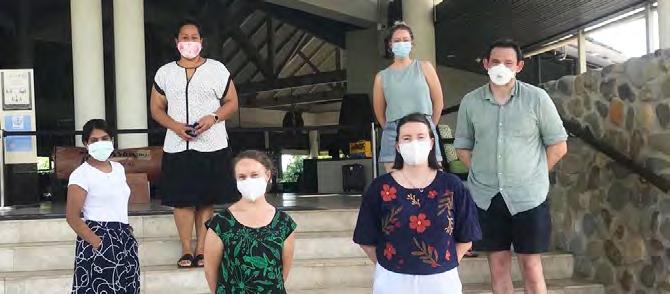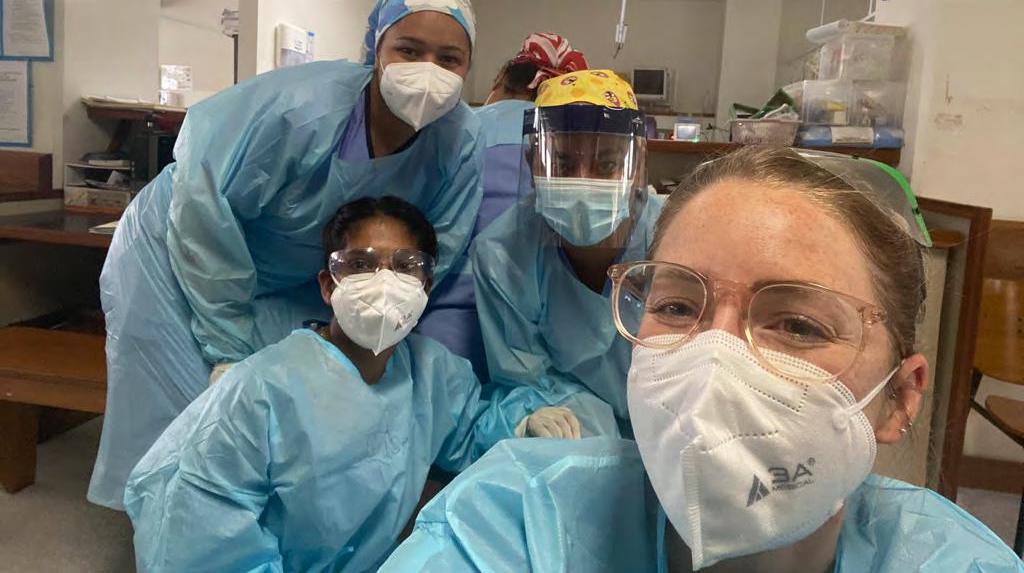
6 minute read
RACS volunteers provide critical help in Fiji
RACS volunteers provide critical support in Fiji
Specialist medical volunteers provide urgent clinical support to two hospitals in Fiji during the COVID-19 crisis
Advertisement
In August 2021, the Department of Foreign Affairs and Trade (DFAT) contacted RACS Global Health to determine if RACS could assist the Fiji Ministry of Health by deploying a specialist medical team through its Pacific Island Program (PIP). The Ministry of Health specifically requested intensivists, anaesthetists, Intensive Care Unit (ICU) nurses, and Infection, Prevention and Control (IPC) nurses. The request was to provide COVID surge support to the Colonial War Memorial Hospital (CWMH) in Suva and the Lautoka Hospital in Ba Province. These health facilities and their healthcare workers were hit hard by the outbreak. The staff needed support and respite as the COVID-19 surge had not waned for months and many had been infected. The RACS Global Health team worked tirelessly behind the scenes to ensure the deployment was managed safely and effectively. This was the first volunteer team RACS has deployed since the onset of the pandemic. The Global Health team assisted in relieving the administrative burden on the volunteers as there was a very tight timeframe to onboard the volunteers before they flew out to Fiji. Within four weeks of receiving the initial request from DFAT, RACS had assembled a team of medical volunteers consisting of anaesthetists and ICU and IPC nurses to fly to Fiji to assist the country as it was recovering from a protracted COVID-19 outbreak. DFAT also provided extensive logistical support to RACS and the volunteers which contributed to the success of this deployment. Dr Ned Douglas led the CWMH team consisting of Priscilla Singh (IPC nurse), Lucy Malcolm (ICU nurse) and Dr Elizabeth Bennett (Intensivist). Dr Megan Walmsley was the Lautoka team leader and was joined by Mackenzie Finnis (ICU nurse). The teams provided direct clinical services and clinical training and mentoring to respond to the needs of the clinical teams at these two hospitals. On their return to Australia in October and during their two weeks quarantine in Brisbane, RACS spoke with Dr Megan Walmsley, Mackenzie Finnis, Lucy Malcolm, and Priscilla Singh about their experiences in Fiji. Dr Megan Walmsley is an existing RACS volunteer who works at the Royal Darwin Hospital in the Northern Territory. In 2017 she volunteered in Fiji as part of the ASA Sereima Bale Pacific Fellowship program. Having previously worked with two anaesthetic colleagues from Fiji, Megan had first-hand knowledge of the situation there. “I knew the extent of stress the hospital [staff] were in at Lautoka Hospital,” Megan said. “I worked with the anaesthetic registrars in the COVID-19 theatre; supported anaesthetic registrars and consultants in the non-COVID-19 theatre—ranging from a six-month-old neurosurgical case to obstetric cases to adult trauma. I also held tutorials and exam preparation classes for registrars; conducted department Continuing Medical Education (CME) sessions; and held daylong workshops at the sub-divisional hospitals of Nadi and Ba on how to recognise a deteriorating patient.” Megan returned to Australia richer from her experience. “I learnt about resilience, teamwork, and flexibility from our Pacific colleagues,” she said. “They have done an amazing job in challenging circumstances with very limited resources.” The Fiji trip was Mackenzie Finnis’ second opportunity to volunteer. As an ICU nurse in an adult setting, her current role is as a nurse educator in Brisbane. She says there is something special in being able to share her skills, which is why she put up her hand when the call to volunteer came up. “By the time we reached Fiji, the procedures on how to deal with COVID-19 had already been laid down,” she said. “When I arrived, the team was seeing one or two presentations a day in the ICU for COVID-19 and non-COVID related issues. The cases were easing because of their great vaccination efforts.” “I provided nursing-focussed education and training in both the COVID and nonCOVID ICUs. I had a good team of doctors and medical staff who were keen to learn about equipment and management of ventilators. I spent some time on direct patient care as the ICU was returning to non-COVID related activities.”
Mackenzie also spoke about how privileged we are in Australia with our healthcare system, especially with the ICU equipment and resources, which Fiji hospitals are lacking. For example, most ICUs in Australia run arterial blood gases every four hours which is standard procedure, to check the ventilation of a patient. “In Lautoka, the ICU didn’t have [equipment to run arterial blood gases] until recently. When I was there an acutely unwell patient would have only one blood gas during the day. I realised there are many assessments we could still perform

without those blood monitoring systems. It’s good reminder that as healthcare professionals we do the best we can for our patients,” she said. Lucy Malcom, an ICU nurse at the Northern Beaches Hospital in Sydney volunteered at the Colonial War Memorial Hospital. When she arrived in Suva, the city was coming out of its worst wave of the COVID-19 Delta variant. Lucy explained that her first week was spent getting to know the staff and understanding how she would be able to assist them. The nursing staff were keen to learn about the best practices on how to look after COVID-19 patients, so Lucy spent three days a week during her deployment teaching face-to-face, along with conducting online classes in the evenings. “The hospital had two ICU wings, the larger one for COVID-19 patients, and the smaller for non-COVID patients,” Lucy said. “It was interesting to work in a healthcare system that was quite under-resourced. I realise how fortunate we are in Australia to have a robust system.” “The equipment that the hospital team was using had been donated by Australia. So, I manipulated my teaching and practices accordingly.” Priscilla Singh was born in the CWMH, Suva, and wanted to volunteer as she saw this as her way of giving back to her birth country. Priscilla wears many hats in her day job in Melbourne. She is an IPC clinical nurse at St. John of God Hospital, Berwick; an Immunisation nurse for the City of Greater Dandenong; and a casual midwife in the public health sector. While in Fiji, she trained the medical team in IPC measures, including donning and doffing; mentoring and educating on COVID-safe measures, environmental cleaning, including waste management; auditing; handling hospital acquired MRSA infections; and vaccinations. She also presented in the local health clinics and to the Fiji Emergency Medical Assistance Team. Like her colleagues, Priscilla is grateful for the Australia healthcare system, which makes her job in Melbourne easier. She continues to share her knowledge widely with the CWMH team and has maintained contact with the staff on the ground, supporting them in whatever way possible. The Fiji volunteering experience was a life-changing experience for the RACS volunteers and something they would like to do again. For Megan, “it would be a great opportunity to continue to work with, support and continue to build relationships with the amazing anaesthesia teams in the Pacific.” Mackenzie said, it was the “most rewarding experience for me in Fiji. Despite working late hours with minimum equipment, the team was welcoming and supportive. I felt their smiles through their masks and the commonalities as healthcare professionals.” Lucy learnt about resilience, hope, and making the best of any situation. “I will volunteer in a heartbeat. I learnt to work through adversity from my Fiji colleagues.” Priscilla will go back again as a volunteer, provided “there are no more hotel quarantines.”
How to apply If you wish to apply to become a RACS Global Health Specialist Volunteer, please email volunteer@surgeons.org along with your: • Current CV • Copy of qualifications • Registration Certificate with AHPRA or the Medical Council of New Zealand
Find out more about RACS Global Health programs on our website.










